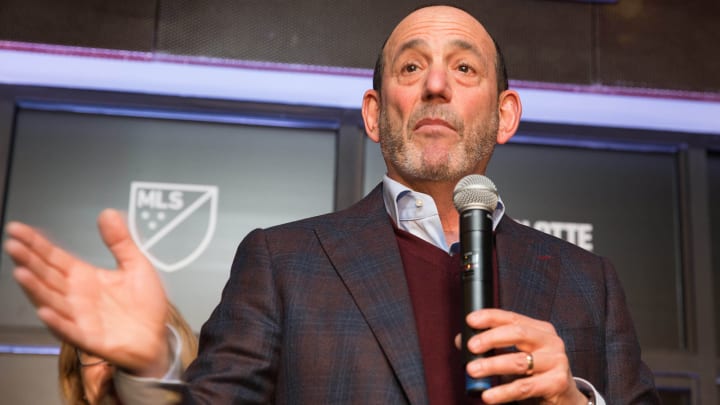CBA Talks Done, MLS Looks Ahead to a Congested 2021

Thanks to extended labor negotiations that eventually produced an amended CBA late last week, MLS will push back the start of its regular season by two weeks to the weekend of April 17-18. The shift will give clubs more time to prepare, but it will cause significant schedule congestion as MLS tries to fit 34 regular season games and four additional competitions into a seven-month window.
Prior to the shift revealed Wednesday by commissioner Don Garber, the MLS playoffs were set to begin Nov. 19 and the MLS Cup final was scheduled for Dec. 11. A change to those dates wasn’t announced, nor was a new date for the start of training camps. Four or five clubs will be on the field even earlier, as the 2021 Concacaf Champions League kicks off April 6-8. The Columbus Crew, Philadelphia Union, Portland Timbers and Atlanta United are the U.S. entrants. The Canadian berth will be determined by a playoff between Toronto FC and Hamilton Forge of the CPL.
“Clearly we’re going to be focused on ensuring that the teams that are involved in the Champions League have the best opportunity to succeed, but the [training camp] timetable hasn’t been set as we sit here today. But it could be something that we’re able to finalize and announce very, very shortly,” Garber said Wednesday.
"We had enormous time pressure to finalize the new [CBA] agreement in order for us to open up training camps and start the season, to accommodate what will be a very, very busy calendar,” he said, adding that the league hopes to unveil a regular season schedule early next month.
That schedule will have to accommodate the CCL (involving 4-5 MLS clubs), the U.S. Open Cup (involving eight), the Leagues Cup (involving eight) and the Campeones Cup (involving Columbus), as well as, perhaps, July’s Concacaf Gold Cup. Previously, the Leagues Cup was supposed to pit the four top finishers in each conference that didn’t qualify for the CCL against Liga MX opposition. MLS may decide to ask clubs to double-up on extracurricular tournaments, or limit teams to one each during a congested timeframe (the Crew already are committed to two, although the Campeones Cup is just one game).
"There’s a lot of work that needs to be done on the competition side,” Garber said. “We have twice-a-week discussions with our product strategy committee, there will be [chief soccer officer] calls to go through how we’re going to decide on who participates in the U.S. Open Cup, what our competition calendar is going to look like, how do we manage the Leagues Cup. These are all important priorities for our league and … I can assure that we’re going to be able to finalize all those issues very, very soon.”
Even though vaccinations have begun, the league doesn’t have much additional information or insight on when fans might be able to return to stadiums en masse to see all those games, Garber said.
“I don’t have any sense that fans are going to be in our stadiums in large number for probably most, if not all, of the season,” he said.
MLS’s financial health is heavily dependent on game-day revenue and absent that, Garber has claimed that the league’s losses approached $1 billion in 2020.
“We have worked on a new long-term [CBA] that allows us to recoup some of the losses over time from the losses that we’re going to incur this year, and we are forecasting to lose pretty close to that $1 billion, if not $1 billion, that we have been talking about,” he said. “When you don’t have fans for the majority of your season, it’s just pure math.”
The recent labor negotiations were triggered by the league’s December invocation of a force majeure clause in the old CBA, which opened a negotiating window and permitted either side to terminate the agreement if faced with significant hardship. That clause remains in the amended CBA and could be invoked again on Dec. 1, thus thrusting both sides into yet another round of talks.
Despite the deficits forecast for 2021, Garber promised Wednesday that enduring additional negotiations wasn’t on the agenda.
“We’ll have labor peace through 2027,” he said. “I certainly hope for all our sake [the force majeure clause] doesn’t ever have to be invoked again. It’s not something that we have discussed. I think not just for our sake but for humanity’s sake, all of us want to get past this pandemic and want to figure out what the next normal is going to look like. … [We] hope that we never have to trigger that force majeure clause ever again.”

A lifelong soccer player, coach and fan, Brian Straus joined SI in 2013 after covering the sport for The Washington Post, AOL and Sporting News.